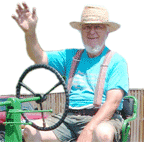 The Bay Gardener by Dr. Frank Gouin
The Bay Gardener by Dr. Frank Gouin
Start Your Fall Garden Now
To eat well into winter, take time off harvesting for planting
Fall vegetable crops are a great source of eating pleasure. Fall-grown carrots and beets are generally sweeter than those grown during the summer. Cabbage, collard and kale plants that have been exposed to an early frost also have a higher sugar content than those grown during summer months.
Late July and early August is the best time for starting your fall and winter garden. Now is the time to sow seeds of cabbage, broccoli, cauliflower, Brussel’s sprouts, kohlrabi, kale, collards, turnips, rutabaga, Bibb lettuce, spinach, beets, carrots and radishes.
The seeds of cabbage, broccoli, cauliflower, Brussel’s sprouts, kohlrabi and Bibb lettuce germinate best in cool conditions, so start them in trays in air-conditioned comfort. Once the seeds have germinated, they can be moved outdoors, where they will tolerate higher temperatures.
Kale, collards and spinach can be sown directly in the garden. I often prefer delaying the sowing of these species until mid-August. With delayed sowing, the plants as well as the leaves are generally smaller but more tender than larger leaves. This is especially true of collards.
Seeds of turnips, rutabaga, beets, carrots and radish must be sown directly in the garden because these plants cannot be transplanted. If transplanted, they will develop useless multiple roots that look like fingers on a hand.
When direct-seeding these crops in the garden, irrigate the seedbed lightly each day. Light and frequent watering helps the soil remain cool with less chance of forming a crust. A crusty soil often prevents seedlings from emerging. This is especially true if the soil is a silt or clay loam.
If you have been gardening all summer long, you will find that most fall crops can be grown with little to no additional fertilizer. Since soils are warm in August, residual nutrients remaining from the previous crops are readily available. If your garden soil contains five percent or more organic matter, you may not need to apply any fertilizer to grow your fall crop.